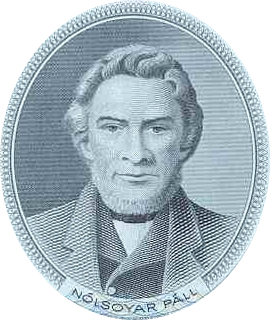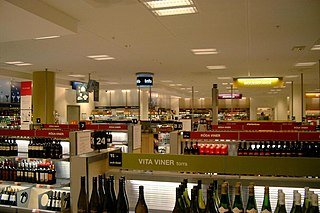Related Research Articles
The early details of the history of the Faroe Islands are unclear. It is possible that Brendan, an Irish monk, sailed past the islands during his North Atlantic voyage in the 6th century. He saw an 'Island of Sheep' and a 'Paradise of Birds,' which some say could be the Faroes with its dense bird population and sheep. This does suggest however that other sailors had got there before him, to bring the sheep. Norsemen settled the Faroe Islands in the 9th century or 10th century. The islands were officially converted to Christianity around the year 1000, and became a part of the Kingdom of Norway in 1035. Norwegian rule on the islands continued until 1380, when the islands became part of the dual Denmark–Norway kingdom, under king Olaf II of Denmark.
Faroese is a North Germanic language spoken as a first language by about 72,000 Faroe Islanders, around 49,000 of whom reside on the Faroe Islands and 23,000 in other areas, mainly Denmark.

Tórshavn is the capital and largest city of the Faroe Islands. It is in the southern part on the east coast of Streymoy. To the northwest of the city lies the 347-meter-high (1,138 ft) mountain Húsareyn, and to the southwest, the 350-meter-high (1,150 ft) Kirkjubøreyn. They are separated by the Sandá River. The city itself has a population of 19,165 (2019), and the greater urban area has a population of 21,078.

The Løgting is the unicameral parliament of the Faroe Islands, an autonomous territory within the Danish Realm.
This is a timeline of Faroese history comprising important legal and territorial changes and political events in Iceland and its predecessor states. To read about the background to these events, see history of the Faroe Islands.

Tvøroyri is a village on the north side of the Trongisvágsfjørður on the east coast of Suðuroy island in the Faroe Islands. Together with Froðba, Trongisvágur, Líðin and Øravík it forms Tvøroyri Municipality.

Sørvágur is a village on the island of Vágar in the Faroe Islands.

Lucas Jacobsøn Debes was a Danish priest, topographer and celebrated writer about the Faroe Islands. He wrote the first book about the Faroes, which was printed and drew the first detailed map of the Faroe Islands.

Faroese literature, in the traditional sense of the word, has only really developed in the past two hundred years. This is mainly because of the islands' isolation, and also because the Faroese language was not written down in a standardised format until 1890. Until then the Danish language was encouraged at the expense of Faroese. Nevertheless, the Faroese language soon became a vehicle for literature in its own right and has produced writers in several genres.

Nólsoyar Páll is a Faroese national hero. He was a seaman, trader, poet, farmer and boat builder who tried to develop direct trade between the Faroes and the rest of Europe and introduced vaccination to the islands. He went missing in the winter of 1808/09 sailing home from England.

The Church of the Faroe Islands is one of the smallest state churches in the world. Prior to becoming independent on 29 July 2007, it was a diocese of the Church of Denmark, a Lutheran church. As of 2019, 79.7% of the Faroe Islanders belonged to the state church.

An alcohol monopoly is a government monopoly on manufacturing and/or retailing of some or all alcoholic beverages, such as beer, wine and spirits. It can be used as an alternative for total prohibition of alcohol. They exist in all Nordic countries except Denmark proper, and in all provinces and territories in Canada except Alberta. In the United States, there are some alcoholic beverage control states, where alcohol wholesale is controlled by a state government operation and retail sales are offered by either state or private retailers.
Rógvi Jacobsen is a former Faroese footballer who last played as a forward for ÍF. He is also the all-time top scorer of the Faroe Islands national football team.

Christian Høgni Jacobsen is a Faroese football striker, who lastly played for NSÍ. Jacobsen has also played for HB, and B68. He has been the topscorer of the Faroe Islands Premier League 3 times. Jacobsen had spells in Denmark with Esbjerg, Vejle, AB, and ÍF Føroyar. He has gained caps with Faroe Islands at senior level.

The Faroe or Faeroe Islands are a North Atlantic archipelago located 320 kilometres (200 mi) north-northwest of Scotland, and about halfway between Norway and Iceland. It is an autonomous territory within the Kingdom of Denmark. The islands have a total area of about 1,400 square kilometres (540 sq mi) with a population of 52,656 as of August 2020.
Jógvan Poulsen was the Lawman of the Faroe Islands twice, from 1654 to 1655, and from 1662 to 1677.

Jóannes Patursson was a Faroese nationalist leader and poet. He served as a member of the Parliament of Denmark and the Parliament of the Faroe Islands.

The National Library of the Faroe Islands is the national library for the Faroe Islands, a self-governing country within the Kingdom of Denmark It is both a public and a research library.

P/F Bakkafrost is a Faroese salmon farming company based in Glyvrar on the island of Eysturoy in the Faroe Islands. Bakkafrost is the largest fish farming company in the Faroe Islands, and is the biggest private employer in the islands. Bakkafrost is the third-largest fish farming company in the world.
The Danish royal trade monopoly, referred to in Faroese as kongligi einahandilin and in Danish as Kongelige Færøske Handel, oversaw all trade between the Faroe Islands and other regions from 1709 to 1856.
References
- Løgtingið 150 - Hátíðarrit. Tórshavn 2002, Bind 2, S. 366. (Avsnitt Føroya løgmenn fram til 1816) (PDF-Download)
| Political offices | ||
|---|---|---|
| Preceded by Jógvan Poulsen | Lawman of the Faroe Islands 1655-1661 | Succeeded by Jógvan Poulsen |
| This article about a Danish politician is a stub. You can help Wikipedia by expanding it. |
